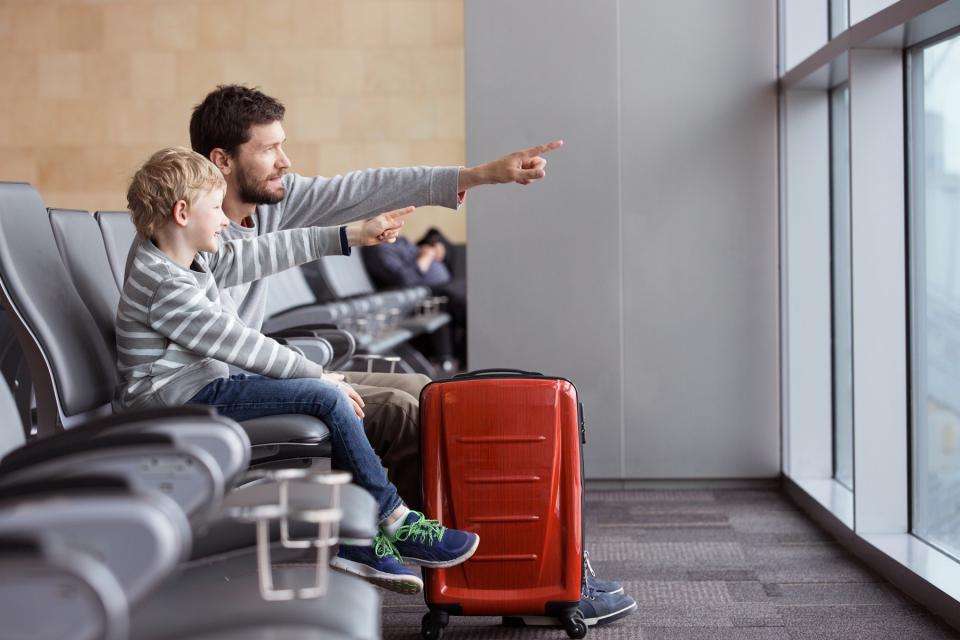What You Need to Know About Traveling Out-of-State with Your Child

Traveling with children is a necessity for many families. Whether it's visiting relatives out-of-state or enjoying a family vacation, travel is a vital and vibrant part of many childhoods.
But while travel can be equal parts stressful and joyous, after a divorce, stress can quickly overwhelm if parents do not make all necessary preparations. Taking a child out of state for vacation will take some coordination from both co-parents.
The most important preparation for traveling with a child out of state after divorce is obtaining consent from the child's other legal guardians. Getting permission from the other parent to travel out of state with a child is crucial.
Can I travel out of state with my children?
Your custody order or parenting plan should outline how traveling with children after your divorce is handled. For some, their court order may not require parents to obtain permission from each other for out-of-state travel. For many, however, their court order will contain consent requirements for parents wishing to travel with their children either out-of-state or abroad.
Even if your court order or parenting plan does not explicitly state that written consent is required to travel with children, it can be a good idea to obtain it regardless. Having a record of the agreement to allow a child to travel out-of-state is critical if disagreements or disputes arise at a later time.
If you are unsure of the requirements outlined in your court order, it's best to consult a family law professional before making any travel plans.
What documentation do I need from my co-parent?
Once you've determined whether any documentation is needed for your trip, you'll need to create that documentation with all relevant information should you run into the need to use it.
While there are no strict guidelines as to what must be included in a child travel consent letter, a general rule of thumb is to include who, what, where, when, and how to get in contact.
- Who will be traveling with the children?
- Who are the legal guardians of your children? List the full legal names of everyone whose permission is required.
- How can you contact your co-parent or child's other legal guardians? Provide a phone number and secondary form of contact for everyone listed on your consent to travel form.
- For what are you asking permission? Make sure the consent letter clearly indicates whether the permission is to travel out-of-state or abroad.
- Where will you be taking your children? Clearly outline your travel plans in the consent letter.
- When will you be traveling? Provide clear itinerary dates for your trip.
Beyond including this information, it is highly recommended that parents sign their child's travel consent letter in the presence of a notary public.
Free child travel consent forms
Permission to travel out-of-state or abroad with a parent
Use this form if your child will be traveling within the United States with either you or your co-parent.
Permission to travel out-of-state or abroad without parents
Use this form if your child will be traveling with someone other than one of their legal guardians, such as a grandparent or extended family member.
Do I need permission if I have sole legal custody of my children?
For parents or guardians who have sole legal custody of children, obtaining permission to travel out-of-state or abroad may not be strictly necessary. Customs and Border Patrol recommends that parents and/or guardians in this situation carry all relevant documentation such as "a court decision, birth certificate naming only one parent, [or] death certificate" that confirms their sole legal custody.
What documentation do I need for my children?
Besides carrying your child's permission to travel form, it may be necessary to have other documentation on hand for your child.
U.S. passport
If you're planning on traveling abroad with your child, you're likely already aware that you'll need a passport for your child in order to do so.
In the United States, both parents are required to provide their consent for children under 16 to obtain a passport. The State Department suggests that the simplest way of showing consent is if all parents and/or legal guardians are present when applying for the child's passport.
However, if parents have joint legal custody and only one of them is able to appear for the application process, the other parent and/or legal guardians can provide their permission by completing this form.
For parents with sole legal authority, they can apply for their child's passport without the other parent if they are able to provide evidence of their sole legal custody.
When you and your child have different last names
Parents who have a different family name than their children may wish to have additional documentation that confirms their relationship on hand while traveling. A child's birth certificate may be appropriate for this documentation. Parents can also carry a marriage or divorce certificate that documents the name change.
Do I need special documentation for other countries?
When traveling abroad, parents should thoroughly research the countries they are visiting to see if they have any documentation requirements for children traveling without both or either of their parents.
If you're traveling with your child to Canada, for example, you must have your child's birth certificate, a letter of authorization from your co-parent (with very specific information), and copies of legal custody documents.
Providing incomplete or incorrect documentation when traveling abroad can hold up an otherwise well-planned trip or prevent it from proceeding entirely.
What if parents cannot agree on travel plans?
If permission to travel out-of-state or abroad with your children is required by court order, parents should not disregard this requirement and travel without it. Doing so may put them in contempt of a court order. Furthermore, if a parent travels abroad with a child without the proper permissions, the act may be considered international parental kidnapping.



